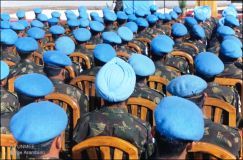Security Council demands Eritrea to lift restrictions on peacekeepers
Nov 23, 2005 (UNITED NATIONS) — The U.N. Security Council on Wednesday passed a resolution that warns of possible sanctions unless Eritrea lifts restrictions on U.N. peacekeepers along the border with Ethiopia and the two sides reverse a worrisome troop buildup.
 The resolution also urges Ethiopia accept a 2000 border agreement, but does not threaten any penalties if the country continues to ignore that appeal.
The resolution also urges Ethiopia accept a 2000 border agreement, but does not threaten any penalties if the country continues to ignore that appeal.
Adopted unanimously, the resolution follows a trip to the region by Japanese Ambassador Kenzo Oshima on behalf of the council. In a report to fellow council members, Oshima had sought the resolution and noted that the “current stalemate is pregnant with risk.”
But he offered no initiatives on how to find a solution except to urge both sides to meet their obligations. Instead, he suggested that countries with influence on the two nations launch a “new series of vigorous diplomatic initiatives to break the stalemate.”
On Oct. 5, the Eritrean government banned helicopter flights by U.N. peacekeepers in its airspace in a buffer zone with Ethiopia. It then banned U.N. vehicles from patrolling at night on its side of the zone, prompting the U.N. to vacate 18 of its 40 posts.
Eritrea gained independence from Ethiopia in 1993 after a 30-year guerrilla war, but the border between the two was never formally demarcated. The border war erupted in 1998 and has claimed tens of thousands of lives while costing both countries an estimated US$1 million (A850,000) per day.
A December 2000 peace agreement provided for an independent commission to rule on the position of the disputed 621-mile (1,000-kilometer) border while some 3,200 U.N. troops patrolled a 15-mile (24-kilometer) buffer zone between the two countries. But Ethiopia refused to accept the panel’s April 2002 decision, which awarded the town of Badme to Eritrea.
(AP/ST)
